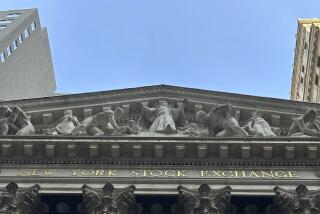‘Short-Sellers’ Not Propelling Tech Rockets
- Share via
NEW YORK — When a stock acts like a Roman candle, as Qualcomm Inc. and JDS Uniphase Corp. have done recently, investors sometimes wonder whether the action is being triggered in part by “short-sellers” scrambling to cover their positions.
In the case of these two highfliers, the probable answer is that momentum players and investors who really believe in the businesses have more to do with the upturn than do short-sellers.
Short-sellers sell borrowed stock today in hopes of replacing it at a lower price later and pocketing the difference. In an explosive stock market such as this one, it is one of the most treacherous ways to make a living.
Qualcomm, the San Diego-based cellular phone maker, has seen its shares zoom 54% in two weeks, to $319.56 on Wednesday in trading on the Nasdaq Stock Market, from $208.13 on Oct. 27. On Wednesday alone, it surged $19.75, or 6.6%, and in the last two months, the stock has more than doubled.
Short interest in Qualcomm as of Oct. 15--Nasdaq’s most recent tally--was 14.2 million shares, down 1.4 million shares, or 9%, from Sept. 15. In other words, on a net basis, a lot of short-sellers quit trying to fight the trend and bought shares to cover their borrowings.
But even if all the “shorts” had thrown in the towel, it wouldn’t account for much of the huge run-up. With average daily trading volume of nearly 5 million shares in Qualcomm, it would take only three days to cover the entire short interest.
That coverage ratio--the number of typical trading days it would take to cover all the short interest--is an important clue for judging whether a stock’s movement is being pushed by short covering.
The highest short-interest ratio among Nasdaq stocks as of Oct. 15 was 67 days, for ATI Technologies Inc., a Canadian multimedia firm. The most heavily shorted stocks tend to have ratios of 25 days or more.
Shares of San Jose-based JDS, which makes fiber-optic components, have soared 44% in the last month, to $189.25 in Nasdaq trading Wednesday. The stock, which added $4.44 on the day, has tripled since May.
This, of course, would be a nightmare for a short-seller--but again, short covering wouldn’t seem to account for much of the move. With short interest of 5.5 million shares and average daily volume of more than 2 million, JDS Uniphase’s ratio--2 1/2 days--was even lower than Qualcomm’s.
(BEGIN TEXT OF INFOBOX / INFOGRAPHIC)
Blasting Off
Shares of satellite-TV companies got a lift Wednesday from the House’s approval of landmark legislation to broaden satellite channel menus. Weekly closes of three leading satellite firms since July, and latest:
EchoStar Communications (DISH): $77.38, up $3.88
Hughes Electronics (GMH): $84.94, up $6.81
Pegasus Communications (PGTV): $64.00, up $11.50






